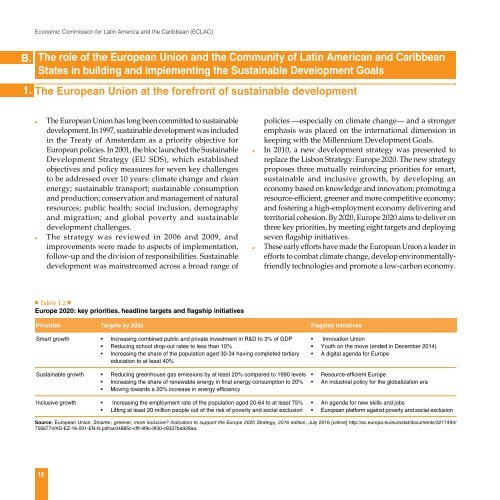La Unión Europea y América Latina y el Caribe ante la Agenda 2030 para el Desarrollo Sostenible: el gran impulso ambiental
Desde todas las regiones del planeta se observa con preocupación el aumento de la desigualdad global y la agudización de la crisis ambiental, especialmente en el caso del cambio climático. Frente a la complejidad de la situación, la comunidad internacional se ha movilizado a través de un extenso debate multilateral para ofrecer una respuesta amplia y ambiciosa. En los últimos meses se han puesto en marcha una serie de acciones colectivas que apuntan hacia un nuevo paradigma de desarrollo más sostenible e igualitario. En septiembre de 2015, la Asamblea General de las Naciones Unidas aprobó la Agenda 2030 para el Desarrollo Sostenible y los 17 Objetivos de Desarrollo Sostenible (ODS), con el reconocimiento de que el cambio climático y el desarrollo son inseparables. En esta línea, en diciembre de 2015 se aprobó el Acuerdo de París, en el que tanto naciones industrializadas como países en desarrollo se comprometen a gestionar la transición hacia una economía baja en carbono.
Desde todas las regiones del planeta se observa con preocupación el aumento de la desigualdad global y la agudización de la crisis ambiental, especialmente en el caso del cambio climático.
Frente a la complejidad de la situación, la comunidad internacional se ha movilizado a través de un extenso debate multilateral para ofrecer una respuesta amplia y ambiciosa. En los últimos meses se han puesto en marcha una serie de acciones colectivas que apuntan hacia un nuevo paradigma de desarrollo más sostenible e igualitario. En septiembre de 2015, la Asamblea General de las Naciones Unidas aprobó la Agenda 2030 para el Desarrollo Sostenible y los 17 Objetivos de Desarrollo Sostenible (ODS), con el reconocimiento de que el cambio climático y el desarrollo son inseparables. En esta línea, en diciembre de 2015 se aprobó el Acuerdo de París, en el que tanto naciones industrializadas como países en desarrollo se comprometen a gestionar la transición hacia una economía baja en carbono.
Create successful ePaper yourself
Turn your PDF publications into a flip-book with our unique Google optimized e-Paper software.
Economic Commission for <strong>La</strong>tin America and the Caribbean (ECLAC)<br />
B. The role of the <strong>Europea</strong>n Union and the Community of <strong>La</strong>tin American and Caribbean<br />
States in building and implementing the Sustainable Dev<strong>el</strong>opment Goals<br />
1. The <strong>Europea</strong>n Union at the forefront of sustainable dev<strong>el</strong>opment<br />
■■<br />
■■<br />
The <strong>Europea</strong>n Union has long been committed to sustainable<br />
dev<strong>el</strong>opment. In 1997, sustainable dev<strong>el</strong>opment was included<br />
in the Treaty of Amsterdam as a priority objective for<br />
<strong>Europea</strong>n policies. In 2001, the bloc <strong>la</strong>unched the Sustainable<br />
Dev<strong>el</strong>opment Strategy (EU SDS), which established<br />
objectives and policy measures for seven key challenges<br />
to be addressed over 10 years: climate change and clean<br />
energy; sustainable transport; sustainable consumption<br />
and production; conservation and management of natural<br />
resources; public health; social inclusion, demography<br />
and migration; and global poverty and sustainable<br />
dev<strong>el</strong>opment challenges.<br />
The strategy was reviewed in 2006 and 2009, and<br />
improvements were made to aspects of implementation,<br />
follow-up and the division of responsibilities. Sustainable<br />
dev<strong>el</strong>opment was mainstreamed across a broad range of<br />
■■<br />
■■<br />
policies —especially on climate change— and a stronger<br />
emphasis was p<strong>la</strong>ced on the international dimension in<br />
keeping with the Millennium Dev<strong>el</strong>opment Goals.<br />
In 2010, a new dev<strong>el</strong>opment strategy was presented to<br />
rep<strong>la</strong>ce the Lisbon Strategy: Europe 2020. The new strategy<br />
proposes three mutually reinforcing priorities for smart,<br />
sustainable and inclusive growth, by dev<strong>el</strong>oping an<br />
economy based on knowledge and innovation; promoting a<br />
resource-efficient, greener and more competitive economy;<br />
and fostering a high-employment economy d<strong>el</strong>ivering and<br />
territorial cohesion. By 2020, Europe 2020 aims to d<strong>el</strong>iver on<br />
three key priorities, by meeting eight targets and deploying<br />
seven f<strong>la</strong>gship initiatives.<br />
These early efforts have made the <strong>Europea</strong>n Union a leader in<br />
efforts to combat climate change, dev<strong>el</strong>op environmentallyfriendly<br />
technologies and promote a low-carbon economy.<br />
Table I.2<br />
Europe 2020: key priorities, headline targets and f<strong>la</strong>gship initiatives<br />
Priorities Targets by 2020 F<strong>la</strong>gship initiatives<br />
Smart growth • Increasing combined public and private investment in R&D to 3% of GDP<br />
• Reducing school drop-out rates to less than 10%<br />
• Increasing the share of the popu<strong>la</strong>tion aged 30-34 having completed tertiary<br />
education to at least 40%<br />
Sustainable growth • Reducing greenhouse gas emissions by at least 20% compared to 1990 lev<strong>el</strong>s<br />
• Increasing the share of renewable energy in final energy consumption to 20%<br />
• Moving towards a 20% increase in energy efficiency<br />
Inclusive growth • Increasing the employment rate of the popu<strong>la</strong>tion aged 20-64 to at least 75%<br />
• Lifting at least 20 million people out of the risk of poverty and social exclusion<br />
• Innovation Union<br />
• Youth on the move (ended in December 2014)<br />
• A digital agenda for Europe<br />
• Resource-efficient Europe<br />
• An industrial policy for the globalization era<br />
• An agenda for new skills and jobs<br />
• <strong>Europea</strong>n p<strong>la</strong>tform against poverty and social exclusion<br />
Source: <strong>Europea</strong>n Union, Smarter, greener, more inclusive? Indicators to support the Europe 2020 Strategy, 2016 edition, July 2016 [online] http://ec.europa.eu/eurostat/documents/3217494/<br />
7566774/KS-EZ-16-001-EN-N.pdf/ac04885c-cfff-4f9c-9f30-c9337ba929aa.<br />
16


















